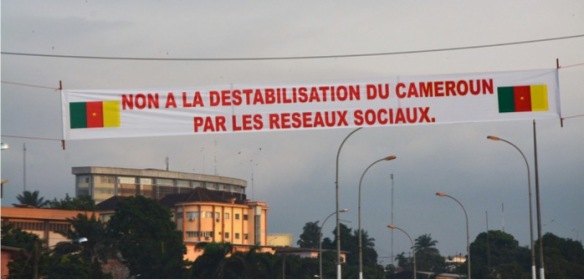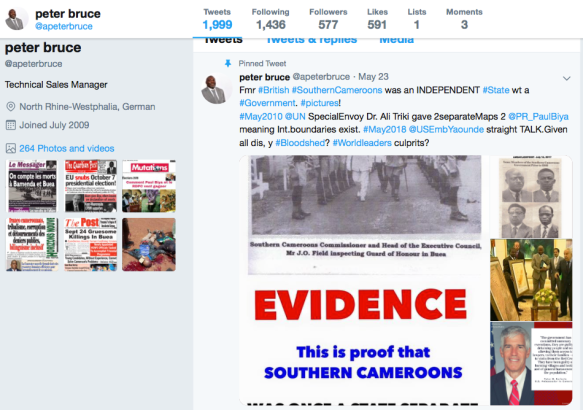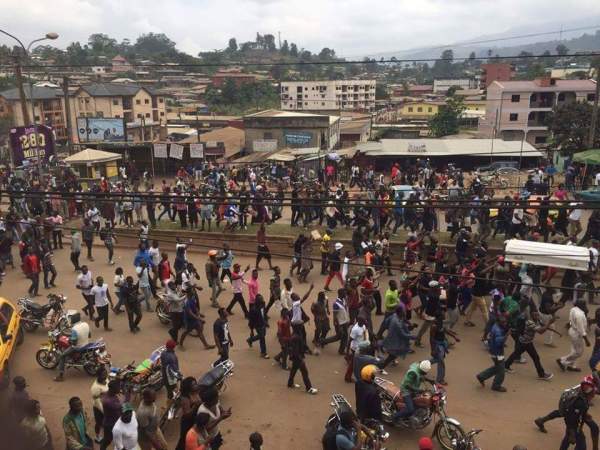
Banner in the streets of Yaounde 2015 @Mirjam
Conflict, yet normal
That the conflict is also felt as mine is because the effects are so close to the circle of people I know. It is therefore that this blog is not an analysis but more a cry for understanding, for being heard. Although, the Guardian, RFI, France 24, and the Dutch Radio 1, have reported on the Anglophone crisis, there is little action. By now France, Great Britain, the USA, the Netherlands should have a firm knowledge of what is going on. It is disappointing to say the least that these voices and big states cannot intervene to rescue a situation that is going of hand. Common people are going through harrowing circumstances which have never been part of their daily lives. Of course they get used to it. As a friend living in Buea apped me (on 28/10), when I told him that atrocities were going on or are going on in Baaba (Ndop): ‘it is normal’, ‘more than 100 villages are turned into football fields’, he continues, meaning they are burnt to the ground. But by whom? by government forces? Or those who are assumed in government circles as terrorists?
Family stories
The other friend who told me that Baaba was in fire, also had his brother kidnapped by the other side of the conflict; the ‘rebels’, as they subsumed him being a traitor. He was tortured and the family received photo and film material of this. The friend in Buea lost his brother to the rebels last July. He was simply kidnapped in front of the wife, five kids, mother, father, grandmother and the sisters. He was executed within an hour. His family had to leave the village and the children of the brother are at his account now. Other friends from Bamenda write regularly: things are not going, the situation is unbearable. And that is in town, in the rural areas it is worse.
As is clear from these few stories the camps are not clear, who fights whom and what are the objectives? The more one tries to understand what is happening the less is clear.
‘They fooled us’
This remark was made by Peter Bruce, who I visited in Germany, Saturday 20thof October. He is a Cameroonian, from Njinikom, a village in Kom in the Anglophone part of the country. A village where we also collaborated with people to develop their stories and to understand histories .The Anglophone part where the stories of atrocities, the number of refugees and IDPs is rising every day. Peter would love to go back, but with his diploma in a master of science he cannot find a good job in Cameroon; here in Germany he works for the pharmaceutical industry. And now he cannot go back, but as soon as the situation changes and Ambazonia will be freed, he goes. They will all fly back home, as confirms a friend. Peter works hard on information around the crisis and discovers that all the stories told in school and in other information circles were fault. He is now gathering information and writing his own history on twitter, including all kind of interesting visual materials. He is angry, because he never knew the real story, and now that he is discovering he is increasingly convinced that things need to change, if necessary, with violence.

Twitter Post of Peter 2018
Diaspora war?
In the meantime the opening picture of this blog that was taken in 2015 in Cameroon, tells a part of the story. There is a great involvement through the media and internet in this conflict, by people who live outside but have claimed this as their war, their battle. Peter and many others in the diaspora are part of the war, as they pay for humanitarian aid that, as Peter admits, might end up being used for other ends. The Ambazonian boys, or rebels as they have become denominated the past months, are supported by this diaspora. However, as the opening paragraph of this blog suggests, the diaspora are not in control of the situation and the ‘rebels’ seem to go increasingly their own way; a way that leads to horror, violence and enormous suffering for a population who did not ask for this. However, many were (and are) in favor of the movement, as the regime of the sitting president never brought any good to their region.
Childrens’ plight
‘I help them, just pick them up, those kids whose villages are burnt and whose parents are missing’. One of the three girls that came to this history teacher in Buea is graduating soon. ‘but there are so many’. These stories are disheartening. The university functions, contrary to schools. Everywhere schools are closed (now almost two years). Those who can afford send their children to schools in French Cameroon, and some manage to send their kids in Regional headquarters although timidly and with a lot of fear. However, these are only itineraries for the parents who can afford this. Most children do not go to school, almost for two years now.
Disposable people
The fact that the last elections held in October, were officially declared as being a victory with 77% of the votes, for Paul Biya, the ever lasting president who is 86 years old, is simply a complete denial of the population’s voices. On internet, twitter and Facebook other results were shown. Such only confirms that people in Cameroon are disposable. Their wish does not count and what is more their lives are simply worth nothing. And the whole world knows.
These are no longer the stories we read on Facebook, or we hear from others. These are the stories of friends and families that we know so well. The conflict in Cameroon is and should be also ours.


 in several towns in this part of Cameroon that were met with violence by the State. Today, 12 December: A call is being made on the internet for declaring a Ghost Town in Southern Cameroon (see Facebook post); what will be the response? The essence of the argument in the protest is the imposition of the Francophone laws, teaching etc. on the Anglophones, a discourse that stands for so much more.
in several towns in this part of Cameroon that were met with violence by the State. Today, 12 December: A call is being made on the internet for declaring a Ghost Town in Southern Cameroon (see Facebook post); what will be the response? The essence of the argument in the protest is the imposition of the Francophone laws, teaching etc. on the Anglophones, a discourse that stands for so much more.

